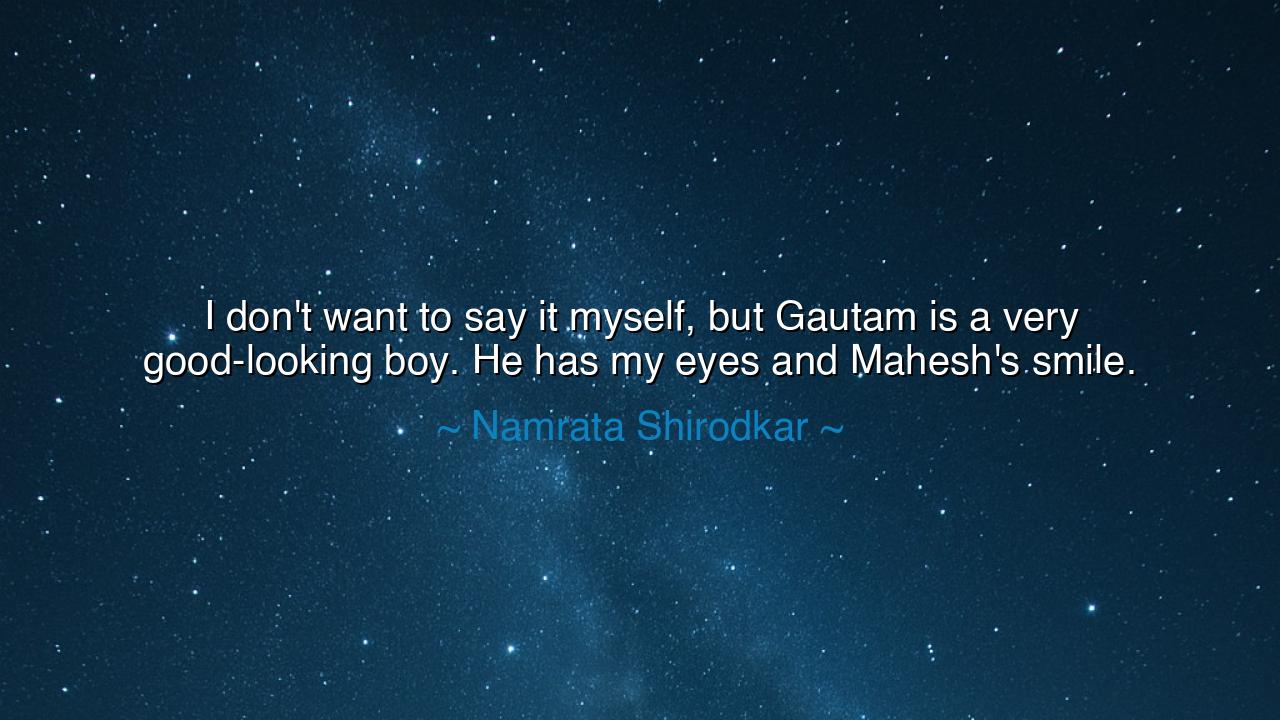
I don't want to say it myself, but Gautam is a very good-looking
I don't want to say it myself, but Gautam is a very good-looking boy. He has my eyes and Mahesh's smile.






Hear now the tender words of Namrata Shirodkar, spoken not from the stage of the world but from the sanctum of a mother’s heart: “I don’t want to say it myself, but Gautam is a very good-looking boy. He has my eyes and Mahesh’s smile.” Though clothed in simplicity, these words are like a song of lineage, a hymn of love, and a testimony to the eternal bond between parent and child. Within them lies the ancient wisdom that children are living vessels, carrying forward the features, the spirit, and the legacy of those who came before them.
The meaning of this quote rests in the mystery of inheritance. When Namrata speaks of her son having her eyes and Mahesh’s smile, she reveals the sacred thread that binds generations together. The eyes, windows to the soul, signify vision, perception, and the inner flame passed from mother to child. The smile, radiant and warming, embodies the father’s spirit, his charm, his joy. Thus, Gautam is not only himself, but also the living union of his parents, a reminder that we are never born as solitary beings—we are continuations of all who came before us.
This truth has been celebrated through history. Recall the tale of Alexander the Great, who, though he carved empires by his own hand, carried within him the fire of his mother Olympias’ ambition and the commanding presence of his father Philip II. Those who looked upon him often remarked they could see both parents alive in him, though he stood as a figure entirely his own. Just as Namrata sees in Gautam her eyes and Mahesh’s smile, so too did the world see in Alexander the mingling of two powerful lineages. And through him, their essence lived on.
Yet beyond inheritance, Namrata’s words are also an expression of love—a love so deep it speaks humbly, almost shyly. She begins with hesitation, saying, “I don’t want to say it myself,” for such is the nature of true affection: it does not boast but overflows quietly, unable to be contained. Her joy in seeing her husband’s smile and her own eyes reflected in her child is not vanity, but wonder—that through the miracle of life, love has taken form again in flesh and spirit.
There is also wisdom here about identity. For though Gautam bears the features of both parents, he is more than the sum of borrowed parts. The child is always both reflection and renewal. The eyes may resemble the mother, the smile the father, but the soul is new, uncharted, destined to carve its own path. This is the balance of inheritance: to honor what we carry, yet to grow into something beyond what has been. In this recognition lies the humility of true parenthood, knowing that one’s child will mirror the past but also step boldly into the future.
The lesson for us is clear. We must see in every child not only their present form but the lineage they embody—their roots, their ancestors, their story written in features and spirit. To parents, the call is to treasure this sacred bond, to rejoice in the small reflections of themselves they glimpse in their children, while also giving them freedom to grow into their own destiny. And to children, the call is to remember that their strength is not theirs alone—it is drawn from countless lives before them, from every smile, every pair of eyes that shaped their being.
Therefore, let each one act: honor your roots, cherish the gifts of your parents, whether they be visible features or invisible virtues. Recognize the lineage you carry, but also strive to add to it, so that those who come after you may inherit not only your features but your strength, your wisdom, your love. In this way, the chain of life is not merely preserved—it is glorified.
Thus, the teaching is eternal: A child is the living echo of their parents, yet also the dawn of something new. The eyes that see, the smile that shines—these are not only features of the body, but symbols of a legacy carried forward. Treasure them, for they are the bridges between past and future, love and destiny.






AAdministratorAdministrator
Welcome, honored guests. Please leave a comment, we will respond soon